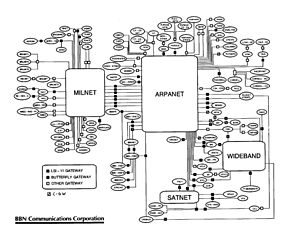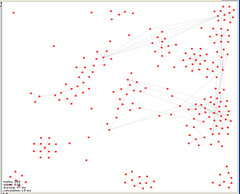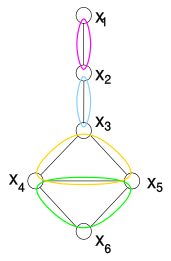
This post wasn’t on the original slate for the Political Economics of Publishing series but it seems apposite as the arguments and consequences of the Editorial Board of Lingua resigning en masse to form a new journal published by Ubiquity Press continue to rumble on.
The resignation of the editorial board of Lingua from the (Elsevier owned) journal to form a new journal, that is intended to really be “the same journal” raises interesting issues of ownership and messaging. Perhaps even more deeply it raises questions of what the real assets of a journal are. The mutual incomprehension on both sides really arises from very different views of what a journal is and therefore of what the assets are, who controls them, and who owns them. The views of the publisher and the editorial board are so incommensurate as to be almost comical. The views, and more importantly the actions, of the group that really matters, the community that underlies the journal, remains to be seen. I will argue that it is that community that is the most important asset of the strange composite object that is “the journal” and that it is control of that asset that determines how these kinds of process (for as many have noted this is hardly the first time this has happened) play out.
The publisher view is a fairly simple one and clearly expressed by Tom Reller in a piece on Elsevier Connect. Elsevier no doubt holds paperwork stating that they own the trademark of the journal name and masthead and other subsidiary rights to represent the journal as continuing the work of the journal first founded in 1949. That journal was published by North Holland, an entity purchased by Elsevier in the 90s. The work of North Holland in building up the name was part of the package purchased by Elsevier, and you can see this clearly in Reller’s language in his update to the post where he says Elsevier sees the work of North Holland as the work of Elsevier. The commercial investment and continuity is precisely what Elsevier purchased and this investment is represented in the holding of the trademarks and trading rights. The investment, first of North Holland, and then Elsevier in building up the value of these holdings was for the purpose of gaining future returns. Whether the returns are from subscription payments or APCs no longer matters very much, what matters is realising them and retaining control of the assets.
As a side note the ownership of these journals founded in the first half of the twentieth century is often much less clear than these claims would suggest. Often the work of an original publisher would have been seen as a collaboration, contracts may not exist and registering of trademarks and copyright may have come much later. I know nothing about the specifics of Lingua but it is not uncommon for later instantiations of an editorial board to have signed over trademarks to the publisher in a way that is legally dubious. The reality of course is that legal action to demonstrate this would be expensive, impractical and pretty risky. A theoretical claim of legal fragility is not much use against the practical fact that big publishers can hire expensive lawyers. The publisher view is that they own those core assets and have invested in them to gain future returns. They will therefore act to protect those assets.
The view of the editorial board is almost diametrically opposed. They see themselves as representing a community of governance and creating and providing the intellectual prestige of the journal. For the editorial board that community prestige is the core asset. With the political shifts of Open Access and digital scholarship questions of governance have started to play into those issues of prestige. Communities and journals that want to position themselves as forward looking, or supporting their community, are becoming increasingly concerned with access and costs. This is painted as a question of principle, but the core underlying concern is the way that political damage caused by lack of access, or by high (perceived) prices will erode the asset value of the prestige that the editorial board has built up through their labour.
This comes to a head where the editorial board asks Elsevier to hand over the rights to the journal name. For Elsevier this is a demand to simply hand over an asset, the parcel of intellectual property rights. David Mainwaring’s description of the demands of the board as “a gun to the head” gives a sense of how many people in publishing would view that letter. From that perspective it is clearly unreasonable, even deliberately so, intended to create conflict with no expectation of resolution. This is a group demanding, with menaces, the handover of an asset which the publisher has invested in over the years. The paper holdings of trademarks and trading rights represent the core asset and the opportunities for future returns. A unilateral demand to hand them over is only one step from high way robbery. Look closely at the language Reller uses to see how the link between investment and journal name, and therefore those paper holdings is made.
For the editorial board the situation is entirely different. I would guess many researchers would look at that letter and see nothing unreasonable in it at all. The core asset is the prestige and they see Elsevier as degrading that asset, and therefore the value of their contribution over time. For them, this is the end of a long road in which they’ve tried to ensure that their investment is realised through the development of prestige and stature, for them and for the journal. The message they receive from Elsevier is that it doesn’t value the core asset of the journal and that it doesn’t value their investment. To address this they attempt to gain more control, to assert community governance over issues that they hadn’t previously engaged with. These attempts to engage over new issues – price and access – are often seen as naive, or at best fail to connect with the publisher perspective. The approaches are then rebuffed and the editorial group feel they have only a single card left to play, and the tension therefore rises in the language that they use. What the publisher sees as a gun to the head, the editorial board see as their last opportunity to engage on the terms that they see as appropriate.
Of course, this kind of comprehension gap is common to collective action problems that reach across stakeholder groups, and as in most cases that lack of comprehension leads to recrimination and dissmissal of the other parties perspective as on one hand motivated by self-interest on one hand and on the other by naivety and arrogance. There is some justice in these characterisations but regardless of which side of the political fence you may sit it is useful to understand that these incompatible views are driven by differing narratives of value, by an entirely different view as to what the core assets are. On both sides the view is that the other party is dangerously and wilfully degrading the value of the journal.
Both views; that the value of the journal is the prestige and influence realised out of expert editorial work, and that the value is the brand of the masthead and the future income it represents, are limited. They fail to engage with the root of value creation in the authorship of the content. The real core asset is the community of authors. Of course both groups realise this. The editorial board believes that they can carry the community of authors with them. Elsevier believes that the masthead will keep that community loyal. The success or failure of the move depends on which of them is right. That answer is that probably both are to some extent which means the community gets split, the asset degraded in a real-life example of the double-defection strategy in a Prisoner’s Dillemma game.
Such editorial board resignations are not new. There have been a number in the past, some more successful than others. It is important to note that the editorial board is not the community, or representative of them. It is precisely those cases where the editorial board is most directly representing the community of authors where defections are most successful. On the past evidence Elsevier are probably correct to gamble that the journal will at least survive. The factors in favour of the editorial board are that Linguistics is a relatively small, tight knit community, that they have a credible (and APC free) offer on the table that will look and feel a lot like the service offering that they had. I would guess that Lingua authors are focussed on the journal title and only think of the publisher as a distant second issue, if they are even aware of who the publisher is. In that sense the emergence of new lean publishers like Ubiquity Press and consortial sustainability schemes like Open Library of Humanities are a game changer, offering a high quality experience that otherwise looks and feels like a traditional journal process (again, it is crucial to emphasise that lack of APCs to trouble the humanities scholar) while also satisfying the social, funder and institutional pressure for Open Access.
Obviously my sympathies lie with the editorial board. I think they have probably the best chance to make this work we have yet seen. The key is to bring the author community with them. The size and interconnections of this specific community make this possible.
But perhaps more interesting is to look at it from the Elsevier perspective. The internal assessment will be that there were no options here. They’ve weathered similar defections in the past, usually with success and there would be no value in acceding to the demands of the editorial board. The choice was to hold a (possibly somewhat degraded) asset or to give it away. The internal perception will be that the new journal can’t possibly survive, probably that Ubiquity Press will be naively under funded and can’t possibly offer the level of service that the community will expect. Best case scenario is steady as she goes, with a side order of schadenfreude as the new journal fails; worst case, the loss of value to a single masthead. And on the overall profit and loss sheet a single journal doesn’t really matter as its the aggregate value that sells subscription bundles. Logical analysis points to defection as the best move in the prisoner’s dilemma.
Except I think that’s wrong, for two reasons. One is that this is not a single trial prisoners dillemma, its a repeated trial with changing conditions. Second, the asset analysis plays out differently for Elsevier than it does for the editorial board making the repeated trials more important. The asset for the editorial board is the community of the journal. The asset for Elsevier is the author community of all their journals. Thus for the editorial board they are betting everything on one play – they are all in, hence the strength of the rhetoric being deployed. Elsevier need to consider how their choices may play into future conditions.
Again, the standard analyis would be “protect the assets”. Send a strong message to the wider community (including shareholders), that the company will hold its assets. The problem for me is that this is both timid, and in the longer term potentially toxic. It’s timid, compared to what should surely be a robust internal view of the value that Elsevier offers. That the quality services they provided simply cannot be offered sustainably at a lower price. The confident response would be to call the board’s bluff, put the full costing and offer transparently on the table in front of the community and force them to do a compare and contrast. More than just saying “it can’t be done at the price you demand” put out the real costs and the real services.
The more daring move would be to let the editorial board take the name on a “borrow and return” basis, giving Elsevier first right of refusal if (and in the Elsevier view, when) they find that they’re not getting what they need in their new low cost (and therefore, in the Elsevier view, low service) environment. After all, the editorial board already have money to support APCs according to their letter. It’s risky of course, but again it would signal strong confidence in the value of the services offered. Publishers rarely have to do this, but I find it depressing that they almost always shy away from opportunities to really place their value offering in a true market in front of their author communities. To my mind it shows a lack of robust internal confidence in the value they offer.
But beyond the choice of actions there’s a reason why this standard approach is potentially toxic, and potentially more toxic long term even if, perhaps especially if, Elsevier can continue to run the journal with a new board. If Elsevier are to protext the existing asset as they see it, they need to make the case that the journal can continue to run as normal with a new board. The problem is that this case can only be made if the labour of editors is interchangeable, devaluing the contribution of the existing board and by extension the contribution of all other Elsevier editorial boards. If Elsevier can always replace the board of a journal then why would an individual editor, one who believes that it is their special and specific contribution that is building journal prestige, stay engaged? And if its merely to get the line on their CV and they really don’t care, how can Elsevier rely on the quality of their work? Note it is not that Elsevier don’t see the value of that contributed labour, it is clear that editors are part of the value creation chain that adds to Elsevier income, but that the situation forces them to claim that this labour is interchangeable. Elsevier see the masthead as the asset that attracts that labout. The editorial board see their labour and prestige as the asset that attracts the publisher investment in the masthead.
You can see this challenge in Elsevier statements. David Clark, interviewed as part of a Chronicle piece is quoted as follows:
He sees the staff departures as a routine part of the publishing world. “Journals change and editors change,” Mr. Clark said. “That happens normally.”
And Tom Reller in the statement on the Elsevier website:
The editors of Lingua wanted for Elsevier to transfer ownership of the journal to the collective of editors at no cost. Elsevier cannot agree to this as we have invested considerable amount of time, money and other resources into making it a respected journal in its field. We founded Lingua 66 years ago.
You can see here the attempt to discount the specific value of the current editorial board, but in terms that are intended to come across as conciliatory. Elsevier’s comms team are clearly aware of the risk here. Too weak a stance would look weak (and might play badly with institutional share holders) and too strong a stance sends a message to the community that their contribution is not really valued.
This is the toxic heart of the issue. In the end if Elsevier win, then what they’ve shown is that the contribution of the current editorial board doesn’t matter, that the community only cares about the brand. That’s a fine short term win and may even strengthen their hand in subscription negotiations. But it’s utterly toxic to the core message that publishers want to send to the research communities that they serve, that they are merely the platform. It completely undermines the value creation by editorial boards that Elsevier relies on to sell journals (or APCs) and generate their return on investment.
Playing both sides worked in the world before the web, when researchers were increasingly divorced from any connection with the libraries negotiating access to content. Today, context collapse is confronting both groups. Editorial boards suddenly becoming aware that they had acquiesced in giving up control, and frequently legal ownership of “their” journal, at the same time as issues of pricing and cost are finally coming to their attention. Publishers in general, and Elsevier in particular, can’t win a trick in the public arena because their messaging to researchers, lobbying of government, and actions in negotiation are now visible to all the players. But more than that, all those players are starting to pay attention.
The core issue for Elsevier is that if they win this battle, they will show that it is their conception of the core assets of the journal that is dominant. But if that’s true then it means that editorial boards contribute little or no value. That doesn’t mean that a “brand only” strategy couldn’t be pursued, and we will return to the persistence of prestige and brand value in the face of increasing evidence that they don’t reflect underlying value later in the series. But that’s a medium term strategy. In the longer term, if Elsevier and other publishers continue to seek to focus on and hold the masthead and trademarks as the core asset of the journal that they are forced into a messaging and communications stance that will be ultimately disasterous.
There’s no question that Elsevier understands the value that editorial board contributions bring. But continuing down the ownership path through continued rebellions will end up forcing them to keep signalling to senior members of research communities that their personal contribution has no value, that they can easily be replaced with someone else. In the long term that is not going to play out well.
















